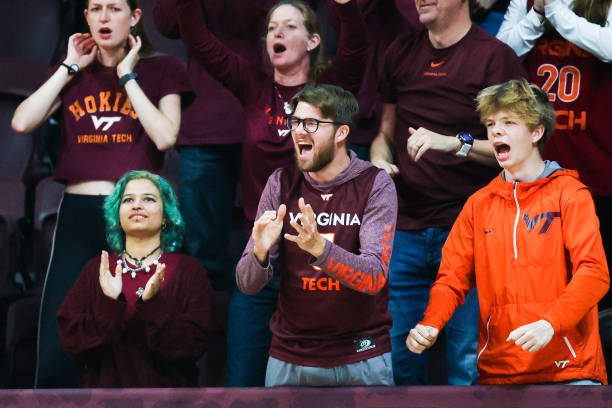A former Virginia Tech soccer player who says she was benched for refusing to take a knee during the national anthem has been given to go-ahead to sue the school for violations of her freedom of speech.
U.S. District Judge Thomas T. Cullen gave former Hokies midfielder Kiersten Hening the OK to sue coach Charles Aidair on First Amendment grounds after Hening says the coach benched her for refusing to join in with the team’s kneeling in 2020 as a “unity statement.”
Hening filed suit against the school and the coach last year, but the school filed a motion to have the lawsuit thrown out. But on Dec. 2, Judge Cullen ruled that the suit could move forward, Fox News reported.

Virginia Tech Hokies fans cheer during the second half of the game against the Charleston Southern Buccaneers at Cassell Coliseum on November 25, 2022, in Blacksburg, Virginia. (Ryan Hunt/Getty Images)
Hening claims she was benched because she often found herself disagreeing with the coach and team’s support of the Black Lives Matter movement. She added that Aidair verbally attacked her repeatedly after her political views began clashing with his. And then he refused to even let her play.
“Hening, who had been a major on-field contributor for two years prior to the 2020 season, also asserts that Adair removed her from the starting lineup for the next two games and drastically reduced her playing time in those games because she had engaged in this protected First Amendment activity. As a result, Hening resigned from the team after the third game of the season,” Judge Cullen wrote in his ruling.

Virginia Tech Athletics
“As a freshman, Hening averaged 76 minutes of playing time; as a sophomore, nearly 88,” the judge continued. “But during the Clemson game [the next game after the kneeling incident], Hening only played 29 minutes, and, at the UNC game, just 5.”
The Trump-appointed judge added that the facts in the case tend to show on the surface that the coach retaliated against the player based on personal political views, not sports. He added that Hening’s right to her own political opinions is “the core constitutional principle… both clearly established and fundamental to a free society, and especially to an institution of higher education.”
Follow Warner Todd Huston on Facebook at: facebook.com/Warner.Todd.Huston, or Truth Social @WarnerToddHuston

COMMENTS
Please let us know if you're having issues with commenting.